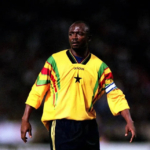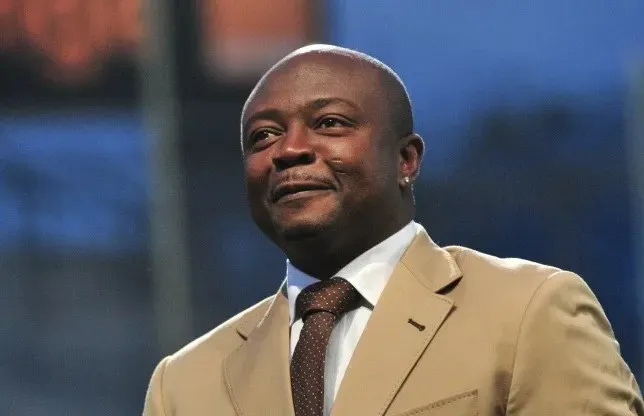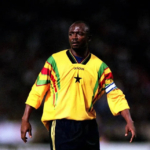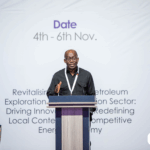
In Ghana, nicknames have a way of sticking, especially when you don’t ask for them. Which is why we all know someone called “Abortion,” “Blackie,” or “Rasta” from our Senior Secondary School days.
A single joke, and suddenly it’s your identity for life.
Our story begins in the late 1970s, on a dusty pitch behind the local elementary school.
The goalposts were crooked sticks, lines drawn by somebody’s slipper. Mothers shouted for their sons to come home before dark. Hawkers clanged their pans, chasing the last sale of the day. A transistor radio somewhere hummed out a faint stream of Ebo Taylor.
Amid the hoopla, was this small, wiry, barefoot boy with visible mosquito bite scars on both legs from the knees down, treating the ball like it was something sacred.
He didn’t run so much as glide, his frame light but sure.
Every touch looked so instinctive a trained eye could tell he didn’t play for attention. He played because the ball listened to him in ways people didn’t.
Then it happened.
A blur of limbs, one fake, then two bodies were left sliding like a Lui Kahn tackle. Before the crowd could process it, the ball was in the net.
From the touchline, someone yelled, half-joking, “Look at Pelé!”.
It drew laughter, then applause, then repetition…the way nicknames spread like wildfire in Ghana. That was all it took.
No christening, no handshake, no ceremony.
Just a word that caught the wind and refused to let go. And so by the time Abedi figured out who the real Pelé was, it was already too late.
The nickname had outgrown the joke and had turned into a prophecy.
Big Dreaming
Born in Kibi in 1964 and raised in Dome, Abedi’s childhood was shaped by modest beginnings. His parents didn’t have much, but they gave him room to chase something that made sense to him.
In those days, football in Ghana wasn’t so much a profession as it was a community release. School was optional and as far as most kids were concerned the streets were the real classrooms. The sport offered an avenue for self-expression and, for a few, a chance out of hardship.
Abedi joined Great Farcos, a local colts team in Dome, where the serious ones went to prove themselves. He was smaller than most, always a step behind in size, but always a step ahead in thought.
A move to Real Tamale United accelerated his career. There, he became the heartbeat of a young, ambitious side. By 18, he was already playing for the Ghana national team. In 1982, barely old enough to vote, he was part of the Black Stars squad that won the African Cup of Nations in Tripoli.
For a teenager, it was a remarkable start. Tangible proof that Ghana had unearthed its next star.
It also foreshadowed an early glimpse of the greatness to come.
The Name Grows Legs
The 1980s were a turbulent era for African footballers seeking opportunities abroad. European clubs were beginning to scout African talent, but the system was poorly regulated. Promises from scouts were repeatedly broken. Contracts were scribbled on cardboard.
Many players chased the dream across the continent with little to no help and Abedi’s journey was equally bumpy. He played briefly in Benin and Qatar, before a short stint in Switzerland with FC Zürich.
But it was France that changed everything.
After short spells with Chamois Niortais and Mulhouse, Abedi’s big break came when he joined Olympique Marseille in 1987.

Arriving at Stade Velodrome at the tail end of the 80s, French football was on the up and up . The club’s president, showman Bernard Tapie, had made it his sole mission to make Marseille the biggest club in Europe. For Abedi, the timing was perfect and Marseille, a restless port city with fanatics disguised as fans felt oddly familiar.
Ayew’s first few seasons were under Gérard Gili, a coach who valued structure, before Raymond Goethals, took charge. Goethal was older, greyer, and infinitely more unbothered by convention.
The Belgian was the kind of coach who’d light a Rothmans on the touchline, stare at the pitch through the smoke, and see things no one else did. He preferred freedom over rigidity, trusting players like Abedi to improvise in the final third.
Goethals’s Marseille played fast, fearless football. His 3-5-2 and later fluid 4-3-3 allowed Abedi to float, pick pockets of space and pull strings in midfield.
Between 1989 and 1993, Marseille dominated France winning four Ligue 1 titles on the trot. Then they reached the 1991 European Cup final before succumbing on penalties to Red Star Belgrade after a tense, goalless draw. For Tapie, it was unfinished business. For Goethals, he’d return to finish the assignment two years later.
In the league, their fiercest rivals were Paris Saint-Germain, a team backed by Canal+ money with stars like David Ginola, George Weah, and Valdo. Every clash between Marseille and PSG was like the battle of Okinawa.
South against North.
Working-class grit against capital glamour.
Velodrome versus Parc des Princes.
Then there was Monaco, the opposite of both. Arsène Wenger ran the club like a laboratory, insisting every tiny detail mattered. So by extension the way his core team of Glenn Hoddle, Emmanuel Petit, Jurgen Klinsmann and Lilian Thuram played was eye candy.
In the thick of the rivalry, Tapie’s money ensured that Marseille was stacked with talent. In their ranks was the prolific Jean-Pierre Papin, who would go on to win the Ballon d’Or in 1991. Then there was the mercurial Chris Waddle, with his iconic shoulder drops. Didier Deschamps, young and eager, was the team’s water carrier. Later came Marcel Desailly, Fabian Barthez, Basile Boli, Rudi Völler, and Éric Di Meco. It was truly a fusion of artists and artisans orbiting around the obsession to win everything.
And yes, right in the middle of it all was Abedi Ayew. Not the left ventricle, but the heart of the team itself, setting the pulse of the play.
French fans called him The Magician because of his penchant for the spectacular. Occasionally he will vanish into a crowd of defenders and reappear where no one expected him, the ball glued to his feet. He wasn’t as flamboyant as Waddle or intimidating like Boli but he was the still point around which Marseille’s chaos spun.
By 1992, he was vice-captain, one of Bernard Tapie’s trusted lieutenants and a symbol of Marseille’s multicultural power. The Ghanaian playmaker who once played barefoot on red dust now orchestrated Europe’s biggest games under floodlights.
After that, the name Abedi Pelé was no longer a nickname or a nod to the Brazil legend. It had become its own truth.
Road to Munich
Marseille’s 1992–93 European campaign began under a cloud of expectation. They had been here before, close enough to touch glory, only to let it slip. This time, they approached Europe like a team with something to prove.
In the second round, they brushed aside Glentoran of Northern Ireland 8–0 on aggregate, Rudi Völler and Alen Bokšić scoring for fun. The quarter-final win against CSKA Moscow carried them into the newly rebranded UEFA Champions League, the first season to feature a group stage.
Marseille landed in Group A alongside Rangers, Club Brugge, and CSKA Moscow again. Only one team from each group would reach the final.
When it ended, Marseille topped the group and were through to their second European Cup final in three years. Waiting for them in Munich was AC Milan, football’s most polished machine.
For Marseille, this was a chance at redemption.
Two years earlier, they had lost the European Cup final on penalties to Red Star. This time, they weren’t there to just participate but to finish the job. Milan were of course the favourites, the perfect team of their era.
Capello’s back line of Tassotti, Costacurta, Baresi, and Maldini was a fortress. Ahead of them stood Rijkaard and Donadoni, while Marco van Basten led the line with deadly exuberance. On paper, Marseille were so outmatched the French papers called the affair Le Mur de Milan . Nobody thought Marseille could break through and for forty tense minutes, it looked like they might be right. Milan controlled possession, moving with cold precision.
Marseille sat back, disciplined, waiting.
Then, in the 43rd minute, Abedi drifted to the left corner flag. One glance, one swing a perfect, curling cross. Basile Boli rose highest and powered it home.
1–0.
The second half was siege warfare. Milan pushed. Marseille absorbed. Barthez punched, Desailly tackled like a man possessed, and Goethals puffed quietly on his cigarette, unmoved by the fracas.
Finally the ref blew his whistle.
The unthinkable had happened. Marseille were champions of Europe becoming the first French club to lift the trophy.
As players and fans erupted, Abedi stood a few steps apart hands akimbo, head tilted slightly upward. Maybe he was remembering Dome. Maybe he was just taking it in. That night, under Munich floodlights, a Ghanaian rewrote the script courtesy a perfect swing of the foot.
After the High
Success in Marseille didn’t last long. Within a year, the club was collapsed under the weight of match-fixing and the city that once adored its heroes turned on itself. Marseille’s league title was stripped off with the team relegated. Abedi left quietly for Lyon, distancing himself from the wreckage. Later came Torino in Italy, then Al Ain in the United Arab Emirates, a slow, graceful winding down of a career that had already burned brighter than most ever would.
By the time he hung up his boots, Europe had begun to welcome a new generation of African stars. George Weah, Nwankwo Kanu, Jay-Jay Okocha, all walking through doors Abedi had helped open. He showed that African players could be more than squad fillers or entertainers. They could lead, influence, and define football at the highest level.
Back home, the story was more complicated. Ghana still adored him, but adoration in football is never gentle. Every missed qualification, every federation controversy somehow circled back to him. When Ghana failed to reach the World Cup in 1990, he took the fall. Then in 1992, he carried the Black Stars to the AFCON final, a bruising campaign that ended in heartbreak in Dakar. Suspended after a yellow card in the semi-final, he watched from the sidelines as Ghana lost to Ivory Coast on penalties after a 0–0 draw. Many still believe the outcome might have been different if he had played.
To this day, Boomers still bring it up in barbershops like an old national wound. Maybe it’s the simple truth that anyone born after ’83 has never seen Ghana lift the AFCON.
Forty two long years of waiting will do that to a people.
And so Abedi was both criticized and mythologized, loved and blamed in the same breath.
The kind of treatment reserved for legends, the kind that burns both ways.
After retirement, Abedi founded Nania FC, a club designed for kids who looked like him at thirteen. Perhaps it was his way of giving them a cleaner start, a softer landing into a game that had given him everything and taken some back.
Fittingly, his three sons Rahim, André, and Jordan would carry his name into a new era, across new continents, under new kinds of scrutiny. Two of them would even go on to captain Ghana and score at the World Cup, actualizing their father’s dream.
Abedi’s tale is one of the extraordinary and the ordinary. Even at his peak, there was something disarmingly simple about him.
The band around his left arm.
The oversized Black Stars jersey hanging loose on his frame.
The skimpy shorts riding high as he dribbled past defenders.
Nothing about him screamed for attention, yet somehow, everyone was watching.
Maybe that was what greatness really looked like for an African footballer. Not the flash, not the noise, but the grace of a man completely at ease with his gift.
For an attacking midfielder his 33 goals in a Black Stars jersey is pretty impressive. Ayew is also the first to win the CAF African Footballer of the Year three consecutive times ( 1991, 1992, 1993).
Abedi Ayew Pelé turns sixty on November 5, just as I wrap up this piece, still carrying that calm aura that once defined him on the pitch.
Time has slowed his steps but not his presence.
Still steady. Still ready. Still unmistakably Abedi.
- President Commissions 36.5 Million Dollars Hospital In The Tain District
- You Will Not Go Free For Killing An Hard Working MP – Akufo-Addo To MP’s Killer
- I Will Lead You To Victory – Ato Forson Assures NDC Supporters
Visit Our Social Media for More




